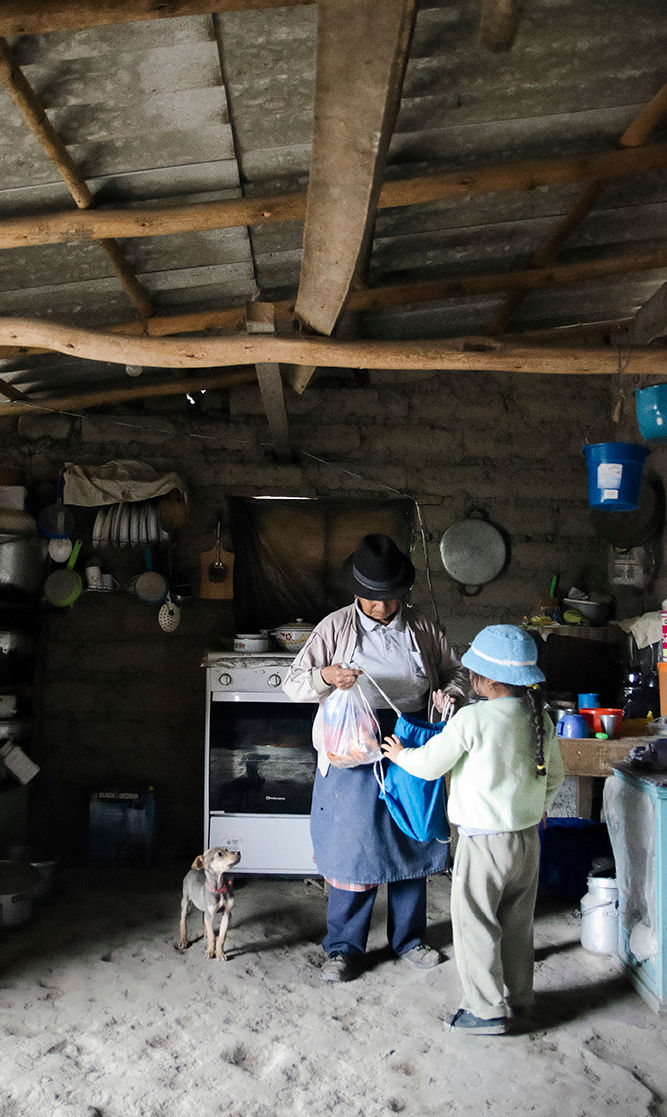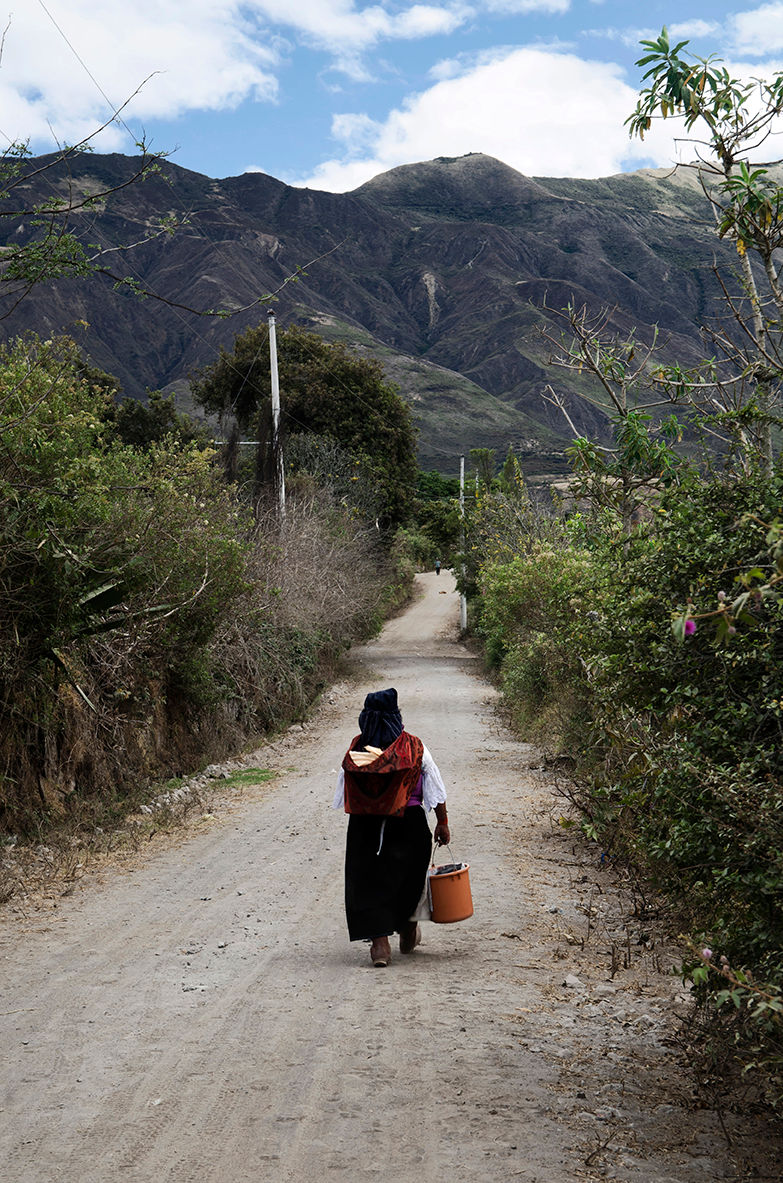JUANA, A VENDEDORA DE MORANGOS
- Ana Caroline de Lima
- Apr 23, 2023
- 6 min read
Updated: Jun 22, 2025
In 2016, I traveled to Ecuador on a special mission: to document the stories of women whose lives had been transformed by microcredit programs. Of the six women I had the privilege to photograph, one quietly shone above the rest — Juana.
So take a moment. Lean back, breathe deep, and spend a minute getting to know her

Anita, Anita! Dinner’s going to be extra special for you tonight!" shouts Melanie, a bright-eyed nine-year-old who lives with her mother, Juana, in the village of San Juan de Ilumán, in northern Ecuador. Up in the Ecuadorian Andes, I became "Anita." You’d probably earn a nickname ending in “-ito” or “-ita” too — age, height, or status doesn't matter. That’s just how affection works here.
Juana’s house isn’t exactly small. It has two bedrooms, a kitchen, and a space for a living room. But tarps instead of a roof and patches of bare brick reveal a story — a home unfinished. And not just recently. It's looked the same for over ten years, ever since Juana’s ex-husband began to build it. At that time, Juana already had three older daughters, all now married and living in their own homes. When her husband found out she was pregnant again, he decided to build a new house.
“This time,” he said, beaming, “I’m finally going to have a son!”
But that wasn’t quite how the story unfolded. A few months after Melanie’s joyful arrival, Juana received news that her husband was leaving.
“He told me he didn’t want to stay married to someone who could only have daughters,” Juana says softly, peeling potatoes for dinner. Then, with a burst of laughter, she adds: “He left, married someone else, and guess what? She had a daughter too!”
With Melanie to care for, Juana had to find a way to support them both. She began selling clothes door-to-door.
“But people never paid,” she says. “They’d ask to buy on credit and I’d feel bad saying no… In the end, I was just losing money.”
Then one day, passing by a strawberry farm, an idea blossomed: selling fruit. She started going from village to village, carrying fresh strawberries door to door. And that’s the journey we’re about to follow.
After dinner, Juana shows me where I’ll sleep — Melanie’s room.
“Tonight she sleeps with me. There’s a TV here, see? I always watch my novela before bed,” she smiles.
I tell her the soap opera is Brazilian. She laughs, then teases me gently, “Don’t stay up too late, eh? We’ve got an early morning tomorrow.”
I’m no soap opera fan, so I turn off the TV and settle in. Before I do, Melanie proudly shows me her wardrobe — a gift from her mom.
“It’s pretty, right? I even wrote my name on it in white-out, so my cousins know it’s mine.”

At half past three in the morning, Juana is already busy preparing buckets of strawberries to sell throughout the day. She bids her daughter a quiet goodbye, carefully balancing a bucket in each hand. Breakfast? There’s no time for that.

We set out on a brisk 20-minute walk to the nearest main road. There was no bus stop—only an old pickup truck waiting. We climbed into its open bed and rode for two hours, the sharp chill of the Andean dawn biting at us as the wind rushed by, until we finally arrived at the bus terminal. From there, we caught a bus that took us onward to the Cahuasqui settlement.

JJuana carefully wraps her kepina—a traditional Quechua cloth used to carry everything from groceries to babies—securing it with a strong knot across her back. Inside, she places one of the buckets, filled with ten kilos of strawberries. The other bucket she leaves at a small neighborhood shop.
“These people are my friends,” she says with a warm smile. “I always leave the bucket here while I’m out selling. If anyone wants a little taste of the strawberries, they’re more than welcome.”

The journey begins. Juana already has her “client list” memorized. She stops at just the right houses—some customers settle last week’s tab (the credit goes on…), while others eagerly buy more strawberries. Everyone knows Juana by now, but I, tagging along with my camera, can’t help but attract curious glances.
“Who’s this?”“Is she your daughter, Juana?”“Where did you come from?”“Why are you taking pictures of her?”
I answer their questions, but more come flooding in. “Why her? There are plenty of other sellers here in Ecuador.”
I smile and say, “Because she’s special. She sells the best strawberries in the country—so good I came all the way from Brazil just to buy them.”
“And here you are, letting these strawberries knock at your door while you miss out! You should buy some too!” I add with a grin.
With that, the bucket starts to empty fast.
“Anita, you have to come here every day to help me sell! Usually, it takes all day to sell two buckets, but today, not even two hours in, and the first one’s already empty.”

I laugh, but hunger and thirst are already creeping in. It’s nearly eleven in the morning, and since 3:30 a.m., Juana and I haven’t eaten or drunk a thing. I stop at a small shop and grab whatever I can find—some cookies and water. Sharing the snack with Juana, I ask if she’s thirsty, since the dry city air, with no rain in two months, had me downing two bottles of water quickly.
“I’m used to it,” she says with a smile. “Usually, I have to walk a lot to sell. Today’s been different.”
“Just about half an hour more,” she continues, “and we’ll reach my friend Esmeralda’s house. That’s where I rest and catch up with friends. Around here, everyone helps each other—you’ll see.”

Besides selling, Juana also barters. Along our walk, we pause several times so she can trade strawberries for beans or other fruits.
“That way, I don’t have to make a trip to the market,” she explains, smiling as she takes some granadillas—a sweet, tangy Andean passion fruit—in exchange.

It’s lunchtime. We get to Esmeralda’s place—Juana’s good friend.
“Juanita really helped me out by selling on credit when I couldn’t pay. Now my little granddaughter waits by the window for the strawberries,” she says with a smile.

“Juanita works so hard. I make her tea with cheese whenever I can, and I always give her a bottle of water. Can you believe she hardly ever drinks it?” says Esmeralda, watching as Juana rinses the dust from her hands.

We say our goodbyes and continue on our journey. Wherever Juana goes, she spreads smiles—and sometimes even offers strawberries for free.
“Look at that little girl; she reminds me of my own daughter. She must be hungry. I’ll give her some strawberries,” Juana says kindly.

We head back down to the main square to pick up the second bucket.

I spot a small restaurant and tell Juana it’s time for lunch. She waves me off gently, saying, “Go ahead, Anita. I’ll wait for you out here.”
I insist, “You’re my guest.”
She smiles warmly and replies, “Thank you, Anita. I’ll bring you a bag of strawberries later!”

Lunch finished and the second bucket in hand, we set off once again to continue our work.

“Juanita, Juanita, come here!” calls Rosa—or Rosita—as she picks through beans alongside her two little children.

Juana strikes up a conversation with her friend, while the children’s curiosity about me and my camera grows. The boy, about ten years old, tries to get noticed by shouting and playfully kicking the family’s puppies.
I turn my attention to the little girl instead, who quietly savors a pumpkin candy and shyly peeks out from behind the curtain.

I snap a photo of the little girl just as the boy grabs her sweet and tosses it onto the ground. The girl bursts into tears, and her mother sighs, “She’s been asking for something sweet for so long. And now, just when I finally got it, you, Pablo, throw it away?”

I dig into the cookie packet I bought that morning—only one left—and offer it to the girl. Her tears begin to fade as a shy smile breaks through. Juana glances at her and tells Rosa, “This is my friend Anita. She’s from Brazil.”

After a few more sales, the strawberries are all gone, and we head to the bus station.

It’s three in the afternoon—time to head home. Juana settles into her seat on the bus and almost instantly falls asleep, utterly exhausted. I take a photo of her, then close my eyes and drift off as well.

Next time, we’ll join Juana at home, where Melanie is waiting for her mom after school. See you then!

Comments